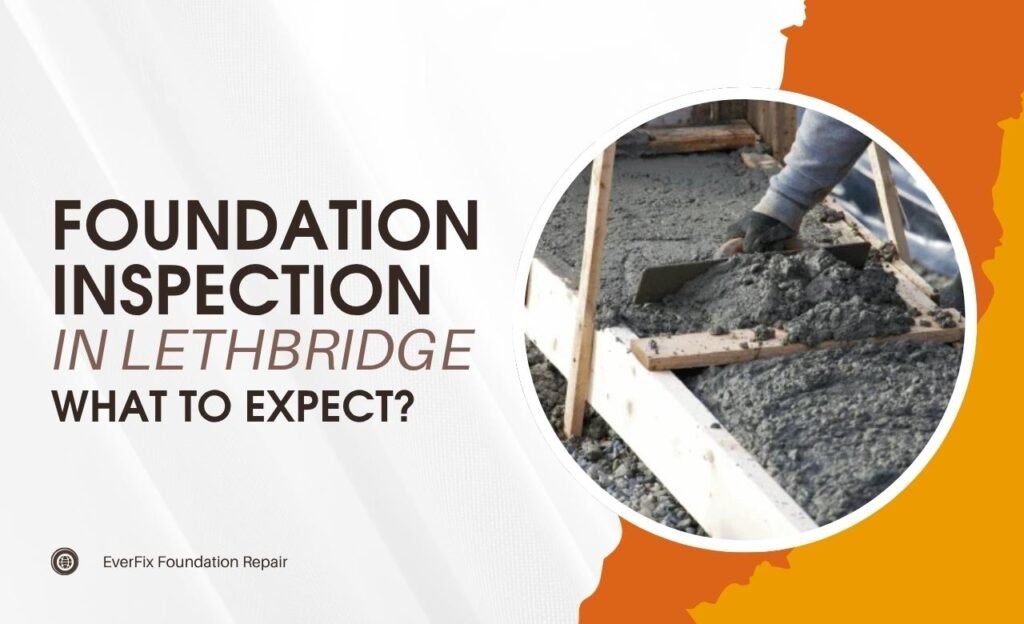Foundation Inspection in Lethbridge – What to Expect

If you’re a homeowner in Lethbridge, getting a foundation inspection is one of the smartest things you can do to protect your home. A strong foundation keeps your house safe, level, and secure. Over time, soil movement, water exposure, and natural settling can lead to cracks or structural concerns.
A foundation inspection helps catch these issues early before they turn into costly repairs. We will walk you through everything you need to know about a foundation inspection in Lethbridge, what it involves, why it matters, and how to prepare.
Why Foundation Inspections Are Important
A foundation inspection is more than just looking at cracks. It’s a detailed check-up that examines the strength, condition, and stability of your home’s base. It also helps detect subtle issues that may not be visible to the untrained eye, such as slight shifts in structure or hidden moisture damage.
These early warnings allow homeowners to make repairs before major structural harm occurs. An inspection gives you a clear picture of how your foundation is performing and what, if anything, needs to be done to keep your home safe.
These inspections help:
- Identify early signs of damage or shifting
- Prevent larger problems before they start
- Give peace of mind when buying or selling a home
- Support maintenance plans and long-term value
In a city like Lethbridge, where soil conditions and seasonal changes can affect home stability, these inspections are especially valuable.
When You Should Get a Foundation Inspection
You don’t have to wait for a big problem to appear before calling for an inspection. In fact, early inspections often reveal small issues that can be resolved quickly and at a lower cost.
Many homeowners are surprised to learn that cracks, moisture signs, or floor unevenness can quietly develop without any obvious warning. Regular inspections help you stay one step ahead and avoid surprises during major events like selling your home or dealing with a structural emergency.
Here are some good times to schedule one:
- Buying or selling a home
- Seeing cracks in walls, ceilings, or floors
- Doors or windows are sticking or misaligned
- Floors feel uneven or sloped
- Water is leaking into your basement or crawl space
- After major renovation work or additions
What Happens During a Foundation Inspection?
A professional foundation inspection is done step by step, and it may take anywhere from 1 to 3 hours, depending on the size of your home and the condition of the structure.
Here’s what a typical inspection looks like:
1. Exterior Evaluation
The inspector walks around the outside of your home, looking for cracks in the foundation, gaps between walls and windows, crumbling concrete, and soil drainage patterns. They will also check the grading of the yard to see if water flows toward or away from your house.
2. Interior Check
Inside the home, the inspector checks basement walls, floors, and ceilings. They look for visible cracks, bowing walls, signs of water intrusion, and anything unusual with framing or supports.
3. Floor Level Testing
Some inspections include using a level tool to measure floor slope. Uneven floors can be a sign that the foundation has shifted or settled in certain areas.
4. Crawl Space or Basement Assessment
If your home has a crawl space or basement, the inspector will go into these areas to check for moisture, wood rot, poor ventilation, and the condition of support beams and piers.
5. Structural Movement Review
The inspector will evaluate signs of foundation movement, such as misaligned doors, cracks above windows, or separation between walls and ceilings.
6. Report and Recommendations
Once the inspection is complete, you’ll receive a report outlining the findings. If any problems are found, the report will include repair suggestions or next steps.
What Kind of Problems Might Be Found?
A foundation inspection might reveal one or more of the following:
- Hairline cracks (minor)
- Large or growing cracks (serious)
- Horizontal cracks or bowed walls
- Uneven or sunken floors
- Wet spots or mold in the basement
- Improper grading or water pooling around the foundation
- Gaps in brickwork or siding
Not all of these mean your house is in danger, but they do indicate areas to monitor or fix. Some issues are simple and cosmetic. Others may require full foundation repair.
How to Prepare for a Foundation Inspection
You don’t need to do much to prepare, but here are a few helpful tips:
- Clear access to basement, crawl spaces, and all exterior walls
- Remove any clutter near cracks or areas you’re concerned about
- If possible, have house plans or past inspection reports available
What It Means If Repairs Are Needed
If the inspector recommends repairs, don’t panic. Early repairs are often simple, fast, and more affordable than waiting. Solutions may include:
- Sealing small cracks
- Installing drainage systems
- Reinforcing or leveling part of the foundation
- Waterproofing basement walls
Your inspector may suggest getting estimates from a local expert for a clear idea of cost and repair time.
Why Choose Local Experts in Lethbridge
Working with local foundation professionals matters. They understand the soil types, common problems, and construction styles in Lethbridge. A trusted local expert can offer solutions that last longer and work better for your home’s conditions.
If you’re looking for reliable and expert service, explore our professional EverFix Foundation Repair to protect and strengthen your home. A foundation inspection is an essential part of keeping your home safe and secure. If you’re noticing small cracks or just want peace of mind, a detailed check by a trained professional can give you the answers you need.
Don’t wait for a small issue to become a big problem. Regular inspections are a smart way to maintain your home’s strength and avoid unnecessary stress. If you’re in Lethbridge and want honest advice or expert help, contact our team today to learn more about our full range of foundation services.
